Oatey’s sponsorship enabled significant HVAC and plumbing repairs for Air Force veteran with disabilities Oatey Co., a leading plumbing manufacturer since 1916, recently partnered with nonprofit organization Miracle Mechanical to make one deserving veteran’s hope a reality through significant HVAC and plumbing repairs. Miracle Mechanical was founded by contractor Brent Ridley with the mission of uplifting families Read more
Featured Articles
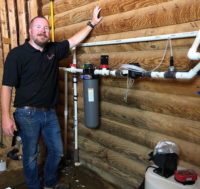
Oatey’s sponsorship enabled significant HVAC and plumbing repairs for Air Force veteran with disabilities
Oatey Co., a leading plumbing manufacturer since 1916, recently partnered with nonprofit organization Miracle Mechanical to make one deserving veteran’s hope a reality through significant HVAC and plumbing repairs.
Miracle Mechanical was founded by contractor Brent Ridley with the mission of uplifting families and communities through plumbing and HVAC repairs at no cost to recipients.
“The whole premise of Miracle Mechanical is to help veterans with disabilities, elderly people and those in need,” says Ridley. “Generous sponsors like Oatey give us the means to transform people’s everyday quality of life.”
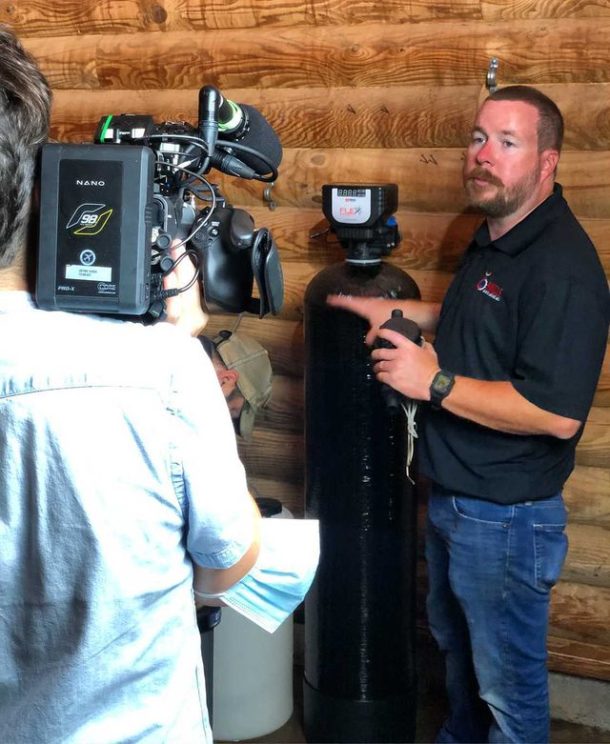
Brent Ridley founder of Miracle Mechanical. He founded Miracle Mechanical with the mission of uplifting families and communities through plumbing and HVAC repairs at no cost to recipients.
The recent Oatey-sponsored Miracle Mechanical project provided much-needed help to Cindy Koehler, a U.S. Air Force veteran who has battled multiple sclerosis (MS) and debilitating physical challenges for the past three decades. Koehler lacked clean drinking water for several years due to her home’s failing water filtration system. Rust, germs and other dangerous contaminants polluted the household water supply, making it completely unsafe to consume.
Through Oatey’s sponsorship, Ridley’s team was able to purchase and install brand new appliances, including an electric water heater, two ADA-compliant toilets and a state-the-art water filtration system – ensuring Cindy and her family have access to the best quality water.
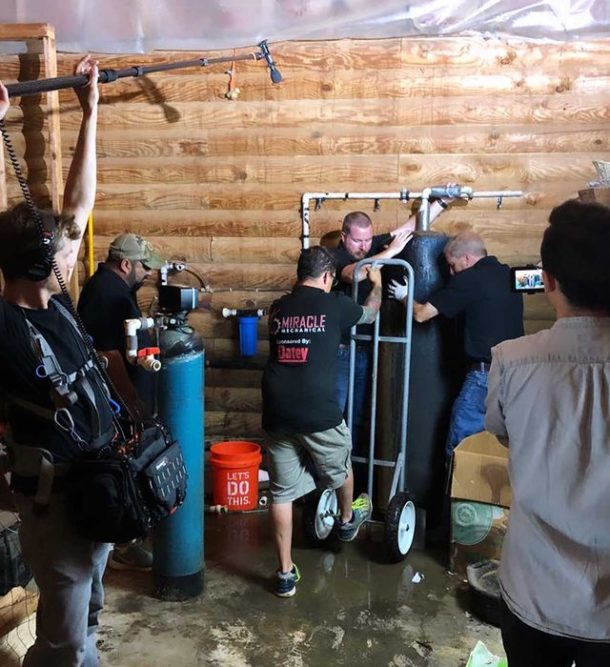
The recent Oatey-sponsored Miracle Mechanical project provided much-needed help to Cindy Koehler, a U.S. Air Force veteran who has battled multiple sclerosis (MS) and debilitating physical challenges for the past three decades.
“Something as simple as clean running water, being able to flush a toilet and wash dishes brought tears in my eyes and joy to my heart,” says Koehler. “Never in my wildest dreams did I think this would happen.”
“Improving lives is a core tenet of our mission here at Oatey,” explains Katherine Lehtinen, Oatey’s Senior Vice President, Brand & Digital Marketing. “When we heard about Cindy’s story, we were thrilled to have the opportunity to help. We’re honored to be a part of such an impactful project and make such a big difference for the U.S. Air Force veteran.”
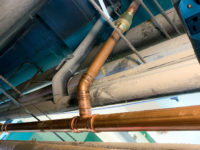
There’s never a good time for a water-main break. But when it happens in the aftermath of a major hurricane, well, that can certainly throw a wrench into things. In September, just after Hurricane Ida hit the United States, staff at Massachusetts Maritime Academy in Buzzards Bay were scrambling. They were preparing for students to Read more
There’s never a good time for a water-main break. But when it happens in the aftermath of a major hurricane, well, that can certainly throw a wrench into things.
In September, just after Hurricane Ida hit the United States, staff at Massachusetts Maritime Academy in Buzzards Bay were scrambling. They were preparing for students to arrive on campus the next day, but a water pipe burst in one of the dormitories.
There was no time to waste. The break had to be fixed immediately or the school would need to delay students’ arrival on campus. In the aftermath of Ida, a massive Nor’easter was unleashed in the New England area, adding to the craziness of the day.
Facility staff at MMA keep Viega fittings and tooling onsite for repairs to what is an aging system, but – as Murphy’s Law would have it – they only had tooling for up to 2” and they needed ProPress rings for 2½” tubing. That’s when Andrew Hiller of CGW Associates got a phone call.
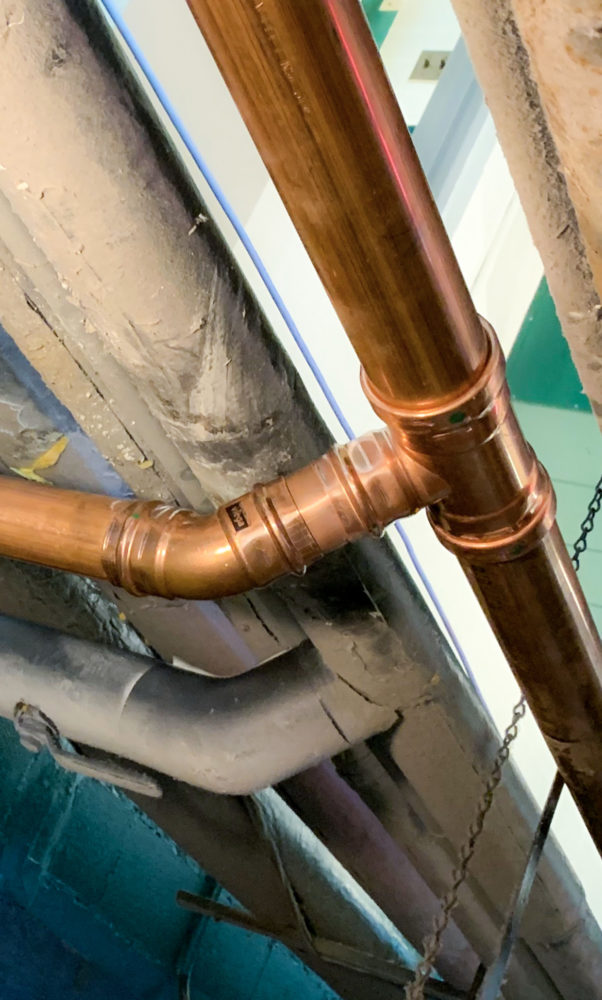
“I raced to my facility to see what tooling I had, but the storm was just massive. The rain was incredible,” Hiller said. “I got rerouted because our main route was underwater – about five feet in some areas.”
Hiller discovered he didn’t have the correct-size rings either, so he called Viega District Sales Manager Dan Paine and told him what he needed. Paine could get the rings from a central storage facility, and the two men coordinated to meet soon after so that Hiller could drive the tools over to MMA.
“I drove through the deepest puddle I’ve ever been through,” Hiller said. “It wasn’t a very big section, but it was very deep!”
Once Hiller got the jaws to MMA, they replaced the entire section of pipe, about 25 feet in length. He said it was aging and a bad design, plus it was a difficult area in which to make the repair. But thanks to Viega fittings and the quick actions of Hiller and Paine, the repair was complete and MMA was back online, ready for students.
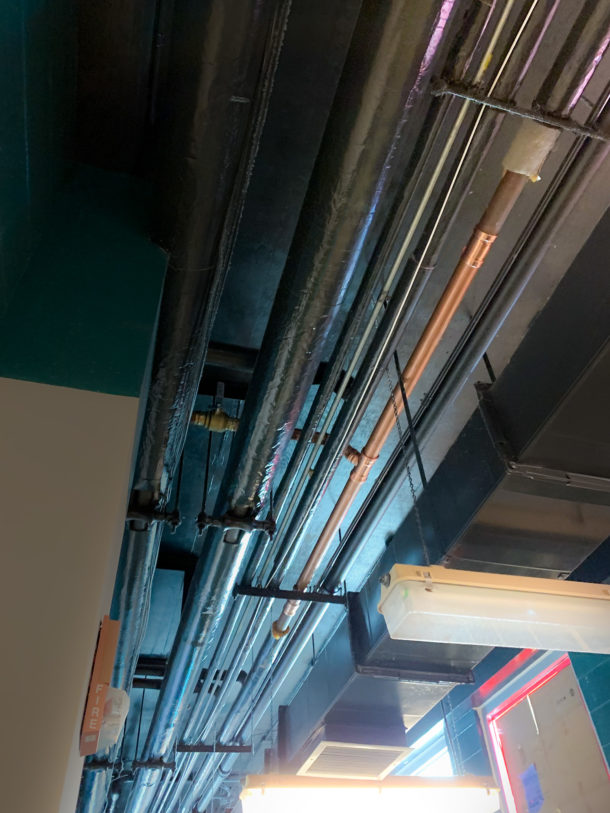
“When our customers need something, Viega is there to help as quickly as we can,” Paine said. “People trust Viega because they know they’re not just getting a great product, but also the service and support that go along with it. I was glad we could lend a hand to help the school get back up and running quickly, with as little interruption as possible.”
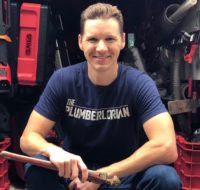
Dating back to the early 1900s with his great grandfather, you could say that plumbing runs in the Plumberlorian’s blood. He, (@theplumberlorian on IG), alongside his brother, has run a family-owned and operated plumbing service and repair company since 2005. He started in the plumbing trade as a part-time apprentice while he was attending college Read more
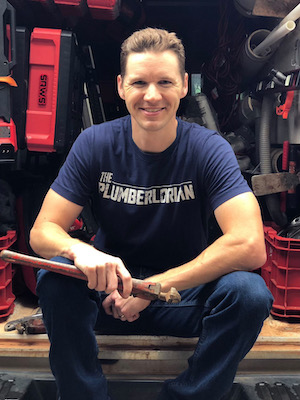 Dating back to the early 1900s with his great grandfather, you could say that plumbing runs in the Plumberlorian’s blood. He, (@theplumberlorian on IG), alongside his brother, has run a family-owned and operated plumbing service and repair company since 2005.
Dating back to the early 1900s with his great grandfather, you could say that plumbing runs in the Plumberlorian’s blood. He, (@theplumberlorian on IG), alongside his brother, has run a family-owned and operated plumbing service and repair company since 2005.
He started in the plumbing trade as a part-time apprentice while he was attending college, and once he graduated, he decided against pursuing a career with the Bachelor’s Degree in Mass Communications he obtained, and became a full-time, licensed journeyman plumber, eventually getting his Master Plumbing license. “I learned most of my skills from working alongside my father as an apprentice; from there it was a matter of repetition and different experiences on the job that eventually led to me getting my journeyman’s and feeling 100% comfortable running a service truck on my own. I later got my master’s and here we are over 16 years later.”
Family is a big part of who he is, and it’s also what keeps him grounded. “I have a loving wife, and two beautiful boys whom I hope to pass down my skills to when they are old enough. I enjoy what I do every day, but for me, it’s not just about the work I do, but also the people I get to meet and help along the way,” says The Plumberlorian.
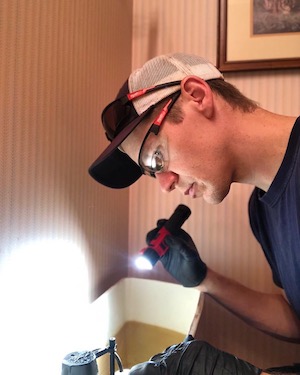 He says it’s always tough to keep a good work/family life balance. “If there’s work related stuff I need to discuss at home, I’ll get that out of the way usually once I get home, but for the rest of the evening I focus on my family, while trying to stay engaged with my wife and kids. I’m all for working late from time to time to get the job done, but you definitely have to find balance. The kids are only young once, and I intend on being there for them and my wife as much as I can,” says The Plumberlorian.
He says it’s always tough to keep a good work/family life balance. “If there’s work related stuff I need to discuss at home, I’ll get that out of the way usually once I get home, but for the rest of the evening I focus on my family, while trying to stay engaged with my wife and kids. I’m all for working late from time to time to get the job done, but you definitely have to find balance. The kids are only young once, and I intend on being there for them and my wife as much as I can,” says The Plumberlorian.
And it’s that family unit that has helped him throughout his plumbing career. The Plumberlorian owes a lot to his father and his brother, both of whom have guided and helped him. “My father would be my biggest mentor in and out of the trade for sure, being a licensed master plumber himself,” he says. “My brother, too and that’s weird to say because he’s my younger brother, but we grew up learning the plumber trade together, and we bounce ideas/tips off each all the time, which is always helpful.”
Does The Plumberlorian consider himself a mentor for others? He does now. “I started the Instagram account to blog my journey, but over just a matter of months, I’ve had a dozen or so reach out to me saying they love what I’m doing on social media and that it’s inspiring. It always catches me off guard when I hear that and I don’t think I’ll ever get used to it. I want to reach more people on here, not just those in the trade already.”
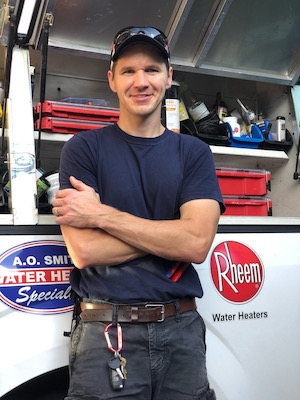 The Plumberlorian has met a lot of amazing people on social media, and he admits he was a “babe in the woods” starting off, yet he was fortunate to have a few people who supported what I was doing right in the beginning. “I have made some solid friends for sure. A few that I talk to on a daily basis, which is so awesome. I have also picked up a few tips and tricks as well from other plumbers on here. I think that’s one of the coolest things from a trades’ standpoint is that we can share with others so easily things we have learned.”
The Plumberlorian has met a lot of amazing people on social media, and he admits he was a “babe in the woods” starting off, yet he was fortunate to have a few people who supported what I was doing right in the beginning. “I have made some solid friends for sure. A few that I talk to on a daily basis, which is so awesome. I have also picked up a few tips and tricks as well from other plumbers on here. I think that’s one of the coolest things from a trades’ standpoint is that we can share with others so easily things we have learned.”
And while the Plumberlorian’s most trusted tools on the truck are his torch, pliers and tape measure, “it’s great that some of these tool brands and others I have used for years are so engaged with their audience. That’s another positive of social media, that it gives them a way to interact with their users, whether it’s just purely for entertainment purposes or their trying to shed some light on a new tool or product. I’ve had the opportunity of having some of my videos shared, which is always great.”
Speaking of social media, the handle @theplumberlorian is such a cool name. “Well, I am a plumber, and a big fan of The Mandalorian. I also can relate a lot to the main character Din or “Mando” in the show. It’s twofold for me: here you have this guy who goes on missions each episode and somehow the mission goes sideways at some point. Being a service plumber, I can definitely relate to that. I’m sure other trades can as well. Some jobs go smoothly from start to finish, but then there’s others that aren’t that way at all,” he says.
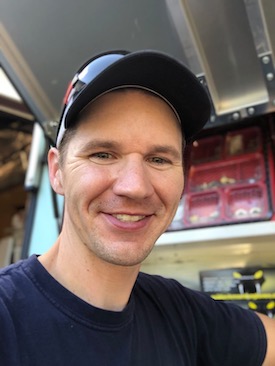 “The important thing is to have the knowledge for when they aren’t straightforward missions, and you can adapt to the changes in front of you. Mando also becomes sort of a father figure to Grogu, this child-like creature he stumbles upon, and being a father myself, there are some scenes that choke me up because in the end, there’s nothing we wouldn’t do to keep our kids safe. He’s a relatable character for a lot of people, and I think that’s why the show is as popular as it is. This is the way.”
“The important thing is to have the knowledge for when they aren’t straightforward missions, and you can adapt to the changes in front of you. Mando also becomes sort of a father figure to Grogu, this child-like creature he stumbles upon, and being a father myself, there are some scenes that choke me up because in the end, there’s nothing we wouldn’t do to keep our kids safe. He’s a relatable character for a lot of people, and I think that’s why the show is as popular as it is. This is the way.”
In the end, he says the plumbing industry needs to do a better job attracting people to the trade; there’s a negative picture painted of blue-collar work by a lot of people who pass it down to their children. “It starts in the home really and it’s a tough nut to crack for some. I’ve met plenty of people who have a positive viewpoint of the trades, but I’ve met others that acted as if it’s beneath them,” says the Plumberlorian.
He says that social media is one outlet for individuals to show blue collar work can be cool, and show a different side of things. “I’ve had so many people reach out to me that I inspire them. Which is crazy to hear, and never gets old. Some have been in their trade for years, others just starting out. That’s what keeps me going, just knowing that maybe I’m making a difference on there. We need more people out there investing in our youth and keeping a positive spin on the job,” he says.
But it starts in the home. What picture are the parents painting, asks the Plumberlorian? “College isn’t the only option, and it may not even be the best option for some so why keep pushing it on your kids? Because that’s what they have stamped in their brain. We have to reach them somehow and change that line of thinking.”
He went the college route because that’s what society was pushing on him, but it’s not for everyone. “You can have a successful life going into the trades, and I will always be an advocate of that,” says the Plumberlorian.
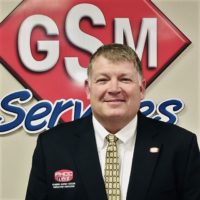
In an unprecedented time, newly elected PHCC president Joel Long says it’s time stop living in fear, and getting back to work is a top priority. Recently, Mechanical Hub had the chance to talk with Joel Long, co-owner of GSM Services, Gastonia, N.C., and PHCC president-elect. Running the nearly 100-year-old business with his brother Steven Read more
In an unprecedented time, newly elected PHCC president Joel Long says it’s time stop living in fear, and getting back to work is a top priority.
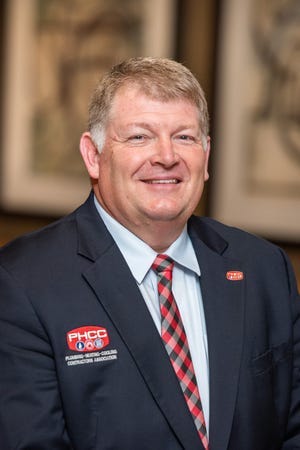 Recently, Mechanical Hub had the chance to talk with Joel Long, co-owner of GSM Services, Gastonia, N.C., and PHCC president-elect. Running the nearly 100-year-old business with his brother Steven. Joel started to work for the family business during high school summer breaks and fell in love with the business. After high school, Long attended North Carolina State University and graduated with a Bachelor of Science (BS) degree in Civil Engineering and Construction and started working for the family business upon graduation. In the following Q&A, Joel talks about his vision for PHCC and some critical issues facing contractors today.
Recently, Mechanical Hub had the chance to talk with Joel Long, co-owner of GSM Services, Gastonia, N.C., and PHCC president-elect. Running the nearly 100-year-old business with his brother Steven. Joel started to work for the family business during high school summer breaks and fell in love with the business. After high school, Long attended North Carolina State University and graduated with a Bachelor of Science (BS) degree in Civil Engineering and Construction and started working for the family business upon graduation. In the following Q&A, Joel talks about his vision for PHCC and some critical issues facing contractors today.
MH: What does the position of PHCC president mean to you?
LONG: I am honored to have this opportunity to serve our industry and association after it has given so much to our company and to me personally. I am thrilled to such a big opportunity to continue the work of those who have served before me and to make a little progress for our members and partners.
We are in a unique position to understand the depth of caring from the PHCC family. As many may know, tragedy befell GSM Services in April of this year with the murder of two of our coworkers. It was devastating to say the least, but PHCC members supported these two families on a massive scale and proved once again there is more good in the world than evil.
MH: What are some things you can take from your career that you can apply in the next chapter as president of PHCC?
LONG: There is nothing quite like the experience you gain while growing up in businesses like ours and then growing into a leadership position in that same business. I have spent a lot of time at the state and national levels seeing what works, what causes issues, and what is broken. I am going to use that experience to hopefully continue to move us forward.
MH: How do you think being in the trades will guide you as the next president of the PHCC?
LONG: I think I fell in love with our trade because the people at all levels are just the best of America. I have always loved how we have a “can-do” attitude and can conquer anything while focusing on our families and doing what is right. PHCC will be operating that same way in my year as president like we have since our founding.
MH: The last 18 months has been quite the experience. What do you tying will be some of your initiatives going forward as we seem to be moving post-COVID?
LONG: I would say we may look back and see these two years as some of the most challenging in our careers. Our members faced many challenges related to the pandemic and PHCC was able to provide a ton of assistance on those fronts.
Our members were deemed essential during the pandemic and continued to send our workforce into client’s homes and businesses as the disease raged. Protecting both customers and coworkers was a major concern all-across the country. PHCC got out front early with our Covid Recovery Center and our members were able to use our center to stay informed of changes and best practices to overcome the pandemic issues. We will be continuing that effort.
I also believe it is time to get back out on the road and live without fear. We are going to lead by example and get our association moving back in a pre-pandemic mode. We must be as safe as possible and respect the concerns of the public, but at the same time we must get back to work on a full-size scale!!!! It’s time to go!
MH: What is your vision to take PHCC to the next level?
LONG: PHCC is a federation of state and local associations and I believe it works best when each level is openly communicating and helping each other reach our individual and combined goals. Communication and collaboration are key to our mutual success. There are so many different opportunities across the country, and we must be very nimble and targeted in our approach to help our partners. We are here to serve our contractor members first and foremost, but our customers are also our state associations. Strengthening those relationships and building on small successes is how we will take PHCC to the next level.
MH: What are some critical issues facing contractors today?
LONG: I have heard from contractors all over the country and they are concerned about how they are struggling to get back to work through all the roadblocks we have been facing this past year or so. We will obviously continue to see the pandemic making us adapt our businesses going forward, but there are also opportunities for growth all around if we continue to search for them. I encourage our members to use PHCC and our members as resources to help find new growth opportunities and information to help your business thrive.
MH: How do we find and inspire the next generation of coworkers?
LONG: I love the movie The Untouchables with Kevin Costner and Sean Connery. One of my favorite scenes is when they are trying to find uncorrupted new recruits for the Treasury Department and they decide to go to the academy to get untainted recruits. We need to do the same to find the next generation.
Before the pandemic, PHCC had developed our online apprenticeship program and we were already having good success in giving students a pathway for a career. As the pandemic grew, our members really started using this as a recruiting tool to convince high school students and their parents that a career in our industry made a ton of sense without the college debt.
I believe today’s youth is looking for a career that helps them grow intellectually, gain financial independence, give opportunities to improve the world, and have opportunities for career advancement. We must continue to get he word out about how our industry can help them achieve their goals.
We must also continue to expand these efforts by widening the exposure of this program to other avenues on a state be state level. We will be encouraging our chapters to partner with as many local school districts, community colleges and HBCU’s about how to expand our opportunities.
MH: Finally, what do you like to do in your spare time?
LONG: I am a sports nut and love college football. I have followed NC State athletics since elementary school and continue to follow today, and as I say every year, this is the year we win the College Football National Championship! Eventually I’ll be correct, right? Also, if you bump into me and have an extra hour, just ask me about being at State when Jim Valvano was our basketball coach.
I also love fishing. Grew up with my father fishing on many Saturday mornings, and I love the time to unwind and reflect from the business. I also love the variety of fishing in N.C. We have wonderful fishing in the intercoastal waters, fresh water lakes all over the state, and my current favorite, trout fishing in the North Carolina mountains.

One of the nation’s largest aerospace firms planned to expand and modernize existing capabilities at an occupied research and development facility in southern California. Xcel Mechanical Systems, based in Gardena, CA, was hired to design and build the mechanical, plumbing and process piping elements of the new project. To minimize risk and maximize labor efficiency Read more
One of the nation’s largest aerospace firms planned to expand and modernize existing capabilities at an occupied research and development facility in southern California. Xcel Mechanical Systems, based in Gardena, CA, was hired to design and build the mechanical, plumbing and process piping elements of the new project. To minimize risk and maximize labor efficiency, the Xcel team selected NIBCO® Press fittings and valves as a smart solution for the multi-phase project.
“Leveraging press technology mitigates the inherent risks of working with open flame within an occupied space,” said Jason Gordon, Xcel Mechanical’s vice president of operations. “We chose NIBCO Press for this job for multiple reasons, including safety, time and labor savings, and aesthetics,” said Gordon, whose firm has been a preferred design-build mechanical contractor on the sprawling campus for more than two decades. “NIBCO is a proven brand name in our industry. That’s important to us because the products we select are a reflection on our company.”
After four carefully planned construction phases, three and a half years of steady and precise work, the $8 million HVAC, plumbing and piping elements of the estimated $50 million laboratory modernization project are nearing completion.
The total renovation project included remodeling existing labs located on the ground floor of a three-story, 1960s-era research and manufacturing facility; labs which must be constantly redesigned and reconfigured to meet the specific requirements of each new contract award. The owner’s primary goal was to convert the subdivided lab space into a large open floor plan, creating the opportunity to build-out a modern, flexible and scalable “factory of the future” that would maximize the total available 160,000-square feet of lab and manufacturing space and 57,000-square feet of office space.
The building was stripped down to concrete on all four sides, exposing what was left: columns, high ceilings, and slabs. The original building design included old stanchion supports with piping and electrical systems running up from the floor. To free up valuable floor space, the new design features steel overhead utility racks that now run 500-600’ feet across the exposed ceiling for a nice clean application. Major mechanical and plumbing systems were removed and redesigned to align with the new design.
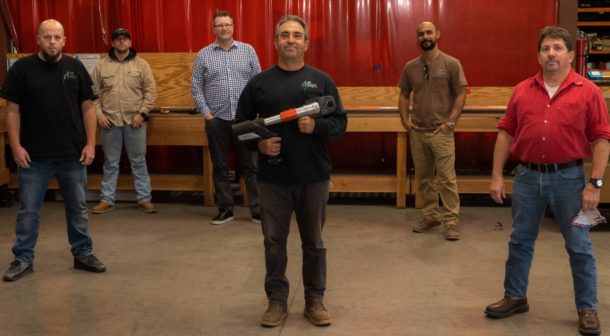
Project team members, from left: Wes Whittle (Piping and Plumbing Superintendent); Foreman Shawn Gibson (Pipefitter, Welder); Jason Gordon (VP of Operations); Foreman Ray Adams (Plumber, Pipefitter); Tim Brown (Service Technician); Steve Prisk, CSHO, ASH (Safety Director).
The Safety Factor
In this facility, the mains on the overhead utility distribution racks are sized 2” down to ¾”. Separately, the HVAC system has chilled water and heating hot water lines measuring up to 4” in diameter. Some of those lines drop down from a chilled water system located on the roof that serves a newly installed air handler.
“Typically, we would use steel for those 4” lines,” Gordon said. “But since the piping ran down an existing shaft, there were safety concerns around welding or grooving the 4” steel. And then there was the weight factor and what would be required to run steel pipe down that shaft versus copper,” he said.
“For these reasons, my foremen advocated for the additional material spend on copper. Obviously, the material cost is considerably more but we felt the safety benefits and labor savings would offset it,” Gordon said. “We are a strong believer in getting perspective from our foremen. If they support the plan, believe in the products they are installing, and it makes sense financially, then it’s a win-win.”
Gordon said using NIBCO Press on the project also meant not having to go through the facility’s Hot Work permitting process which typically adds time to any project. “The customer liked that the NIBCO product removed a certain level of risk, and also the smell of soldering and flux from an operational lab environment,” he said. “So, in the end, our customer was happy. Our safety team was happy. And our field personnel were happy.”
Labor Savings is Big
NIBCO Press is easy to install which helps reduce labor costs while keeping projects on schedule. “Material is material, but labor is what makes or breaks a job,” Gordon said. The project’s process piping system consists of three copper lines, one each for compressed air, nitrogen, and industrial vacuum systems. Each run is 400-500’ long and includes multiple connection points. Gordon said the press product made working in smaller areas and also making multiple connections overhead much easier from both a safety and labor efficiency perspective. “We fabricated a fair amount of material used in this job, but with a multitude of small overhead connection points located 6-12’ apart along these lengthy runs, the copper press solution was key. We saved a minimum of 30-40% on labor on some parts of this job, and significantly more on other parts,” he said.
Minimizing System Downtime
Through the life of the project, the ongoing challenge was to build safely around the 100-200 employees who were working in the lab areas. The project’s four-phase approach called for temporarily relocating employee teams into other parts of the facility while completing construction one section at a time. “Using NIBCO Press not only reduced labor time, but it shortened shutdown periods, allowing us to get the building back online sooner.”
Looking Good
Although functionality and flexibility played an important role in modernizing this facility, creating a visually appealing space was also a consideration, Gordon said. “Aesthetically the NIBCO Press product is a good-looking product and a clean application overall,” he said. “For nitrogen systems, we would typically purge and braze, and afterward the copper is oxidized. When we install press, the copper looks brand new. It’s a good look.”
Smart Solution
As the project nears completion, Xcel Mechanical will continue to use NIBCO Press systems to ensure their reputation for high quality and good workmanship is maintained. Press is easy to install and the labor cost savings generated cannot be understated. The proven performance of Press makes it a smart solution for every job.
For more information, visit www.NIBCO.com or contact Sally Boyer, manager of marketing communications, at boyers@nibco.com.
